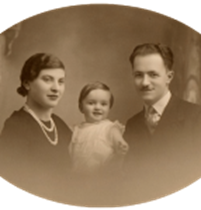Editorial
Volume 3 Issue 5 - 2019
Roger Puybouffat (1909-1983): A man who said « No! »
DDS, PhD in History of Sciences and Technics, Laureate and Associate member of the National Academy of Dental Surgery, Free member of the National Academy of Surgery. 145, route de Vannes, 44800 Saint Herblain, France
*Corresponding Author: Xavier Riaud, DDS, PhD in History of Sciences and Technics, Laureate and Associate member of the National Academy of Dental Surgery, Free member of the National Academy of Surgery. 145, route de Vannes, 44800 Saint Herblain, France.
Received: February 02, 2019; Published: February 05, 2019
Roger Puybouffat was born on February 18th 1909. At the age of 11, Roger obtained his school certificate. But, his family was penniless and he had to work very young and did all kinds of small jobs. One of his uncles allowed him to start an apprenticeship with a dental mechanic. He showed very early provisions for this profession. His uncle convinced him to take evening classes. After obtaining his elementary and higher certificate, he began studying dental surgery at Garancière. Danielle Casanova studied at the same time as Roger. In 1933, he officially graduated, but he was exhausted. Indeed, to be successful, he had worked for a living while studying and, in the same time, was an active member of the Communist Party which he had joined since he was 14 years old, following his father who adhered to it from its creation in 1920. During his last two years of studie, Adele, his wife, renounced to her own studies to provide for the couple [2; 4].
On October 30, 1934, he performed his military service, but had a medical discharge for illness. He was incorporated in October 1935. He left the army as reserve officer of the medical unit [4]. When the war broke out, Roger Puybouffat was called up on August 25th 1939. He joined his unit on September 2. He was present at Dunkirk and managed to get his people out of the trap, and to bring them back safe to Pontivy, which was already under the German flag. The amazing feat consisting in having saved all his men, remained one of his great reasons of pride for the rest of his life [4].
Back to Pontivy, he was arrested by the Germans. As he had not been demobilized yet, he was considered as a war prisoner and had to exercise his talents in the civil hospital set up in the high school compound. He was not released until February 19th 1941. On 1st March, Roger headed to Châteaubriant where he had found a colleague, Pierre Bernou, who welcomed him and offered him the opportunity to practice his art [4]. In the same time, the Choisel camp opened its doors back in May 1941. It was dedicated to hold in custody political leaders such as communists in particular. Since September 26th 1939, the Communist Party was banned. All its members were recorded on notebook B, the main security tool used under the 3rd french republic. This was the case of Roger Puybouffat [4].
As soon as the Puybouffat couple arrived in Châteaubriant, they got in touch with local communists, who made no secret of their intent to break the internees out of Choisel camp. And Roger helped them [4]. As the camp reopened, Roger was requested to heal the prisoners. Therefore, he tried for example to convince Guy Môquet to have one tooth removed since he was suffering terribly. The young man refused to do so without his mother’s agreement [4].
The jailed patients who had major issues could, if they were escorted, be treated in Puybouffat’s personal dental office. The place comprised two ways out, including an unknown one, allowing all kinds of stealthy meetings, exchanges of information and orders. Roger had furthermore other offices in several neighbouring villages, making these exchanges even easier [4].
Since he was a public figure in the city, he was welcomed at the bridge club where he met, while gathering information, representatives of the administration of the Vichy government [4]. At Choisel camp, jailbreaks increased. Its new manager, Touya, decided to reinforce surveillance measures. For instance, the dentist could no longer treat political prisoners. They were allowed to care for ordinary prisoners only [4].
On October 20th 1941, the Lieutenant Colonel Hotz was killed in Nantes. In retaliation, Germans wanted to execute some hostages: this is the episode of the famous 50 hostages, including Guy Môquet. Before they died, those men wrote their last farewell message on the planks of the barrack of the camp. Roger Puybouffat picked them up, hided them for a while in his office and in his house, in a room dedicated to his resistance activities where he and his wife hosted the escapees until the right people drove them to proper hiding places [4].
On October 25th 1941, our dentist took part in the escape of three men detained in Choisel camp. Touya himself searched the dental office, but did not find anything [4]. On December 13th, Roger Puybouffat was arrested by Trouya, second-lieutenant of the camp, blaming him for the November 25-26th evasions. He was questioned, beaten, but did not talk. In spite of severe harassment, Roger did not surrender. There were no proofs against him [4].
His detention was formalised on December 15th by the prefect of Loire-Atlantique [4]. On May 7th 1942, the dentist faced the Correctional Court of Châteaubriant. It showed that Roger Puybouffat, known as a communist militant, was recorded on notebook B. However, he was acquitted, for lack of evidence, but not released. His wife was arrested two days before with his associate. They were released at the end of 1942. On May 7th 1942, Roger was moved to Voves, in Eure-et-Loire. He was chained to two other prisoners and to a policeman. Although his father had it all planned, Roger refused to escape [4].
In June 1943, the dentist had to go to the Court of Appeals of Rennes to be tried again. This second trial was not conducted. On October 12th 1943, he was moved to Romainville. On October 25th, Roger Puybouffat, communist resistant, was deported toward Sarrebruck, Neuengamme, then Mauthausen and Loibl-Pass, one the Austrian camp commandos [4]. When he arrived in Mauthausen, Roger had been jailed, had not eaten properly, and had been bounced from one cattle car to another for 22 months. In this camp, Roger resisted firmly and tenaciously to hunger, winter cold, summer heat, all kinds of violence, exhausting work in the famous quarry, endless calls whatever the weather, etc. [4]
During the winter 1943, Roger contracted bronchopneumonia of the two lungs. The doctor of the infirmary did his outmost to heal him, but he quickly recovered. To avoid selections, Roger had to go back to his exhausting work at the quarry. His comrades hid him, gave him additional rations, protected his stuff and did not hesitate to steal to bring him more food [4].
On May 6th 1944, our dentist is moved to Loibl-Pass, Mauthausen kommando. He had his left tibia broken and his left foot crushed, probably in the tunnel. The doctor built him a splint, but visit at the hospital was shortened, because of the huge risk of selection [4]. During the winter 1944-1945, he had a second bronchopneumonia, quite likely as a result of two nights standing in front of the barrack of guards, under the rain, after his working days, because Roger had lost, according to them, a dental gripper. Indeed, deprived of any material, the French dentist had no other choice, to cope with scurvy which is raging since 1944's spring, than to remove the ill teeth of his comrades, in order to avoid any complication related to their disaggregation. After giving his contribution in cigarette to the community, the scientist exchanged what he had left for a clove of garlic or a little onion, to protect himself against scorvy [4].
Roger Puybouffat was there when an itinerant commission of dentists stopped at the camp in order to extract decayed teeth, especially gold teeth. The clandestine organisation of the camp protected the hapless people involved, against cigarettes. He was also present during the famous “onion operation” that occurred a Sunday morning, in Loibl-Pass, where Germans gave each prisoner an onion to eat, to fight against scurvy, after they stood for a very long time in the bitter cold. This operation took the life of two young men.
On May 7th 1945, Nazis started to evacuate their prisoners. Roger decided to stay with the doctor at the infirmary to take care of the remaining sick prisoners. The two men barricaded themselves and had a look around to gather food, which they finally found in the kitchens. During the following days, intense fighting took place around the camp. Nevertheless, the dentist and the doctor decided to stay with their patients, who could not be moved [4]. It was not until May 21th that Roger Puybouffat joined the Liberty squad stationed in Rodovljica. His left foot was still in bad shape. There, this French brigade, in association with Yugoslav troops, defended a bridge and prevented its destruction. On June 3rd, the Liberty squad was in Trzic, with the utmost appreciation to its inhabitants for their hospitality. On June 5th, the squad arrived in Ljubljana. On 6th, theFrench members of the squad took a train to Trieste. They arrived in Paris on June 20th 1945. There, Roger reached his Adele [4].
The dentist arrived in Paris, in a catastrophic medical state: one of his eardrums had bust because of the blows; he could not consume solid food without vomitting; his lungs were crippled with nodules, resulting from two bronchopneumonia; his fracture to the tibia was not healed and had a fistula, leaving no hope of recovery; his cervical vertebrae had been weakened by the blows. Don't forget than this man, as soon as he was free, took up arms against Nazis, in this state [4].
Despite the serious medical prognosis from the doctors, his wife did not let herself be taken in and decided to fight for her husband. She acquired food that suited to his condition and started a slow and progressive refeeding process. Little by little, Roger managed to recover and to feed himself better and better, in such a way that one day, he was able to practice his former profession again. Therefore, his wounds were not cured without permanent damages and he suffered constantly while working [4].
In 1954, the couple found an adequate apartment to host a dental office. In 1963, wounded by a cervical vertebra, Roger was quadriplegic in the fetal position. Nobody wanted to take the risk to operate on him. Thanks to associations, a neurologist, whose family had been exterminated during the war, accepted to intervene. The doctor travelled at its own expense. The surgical operation was successful. After months of physical therapy, the dental office opened its doors again [4].
However, his injuries, especially those at the left side, made his work difficult, less and less precise. With a heavy heart, Roger had to give up his profession. In 1980, his left leg was amputated, at mid-thigh, and his right one threatened to receive the same treatment. His days boiled down to reading the newspaper and watching television, as he could not move by himself anymore. Therefore, his wife decided to invite friends, relatives, to organise meetings, to drag him to the restaurant; she took care of his appearance by asking his hairdresser and his tailor to come at home. Nights were horrible. While sleeping, Roger constantly returned to Mauthausen and Loibl-Pass [4].
His lesion in the cervical area was only in remission and his uvula and the back of his throat paralysed, making any meal extremely painfull. Adele treated him until she dropped, and died run over by a car in March 1983 (4). Roger slipped into coma and deceased in his turn, in December 1983. Supported by his wife, Roger regarded his 38 living years after the camps as “years stolen to nazis” [4]. Roger Puybouffat received the Military Cross with clusters and and the Legion of Honour. On 25th November 1948, he was issued a certificate of membership of the French Resistance (n°7983) for the services he rendered from May 1941 to June 19th 1945, the date of his repatriation. He was member of the Resistance's organisation “Front national”. His wife, Adele, also received such certificate (1; 4).
Tranlations
(2) - Jamin Sophie, The French dental surgeon during the second world war, Ph.D. Thesis. Dent. Surg., Rennes, 2011.
(3) - Puybouffat-Merrien Rose, personal communication, Paris, 2010.
(4) - Puybouffat-Merrien Rose, « Roger Puybouffat, dentist at Choisel camp in 1941 », in Journal La Mée, Châteaubriand, 2008.
(*) Doctor in Dental Surgery, PhD in History of Sciences and Technics, Laureate and Associate Member of the National Academy of Dental Surgery.
(2) - Jamin Sophie, The French dental surgeon during the second world war, Ph.D. Thesis. Dent. Surg., Rennes, 2011.
(3) - Puybouffat-Merrien Rose, personal communication, Paris, 2010.
(4) - Puybouffat-Merrien Rose, « Roger Puybouffat, dentist at Choisel camp in 1941 », in Journal La Mée, Châteaubriand, 2008.
(*) Doctor in Dental Surgery, PhD in History of Sciences and Technics, Laureate and Associate Member of the National Academy of Dental Surgery.
References
- Amicale de Châteaubriand-Voves-Rouillé, « Puybouffat Roger », in http://www.amicale-chateaubriand.fr, no date, pp. 1-2.
- Jamin Sophie, Le chirurgien-dentiste français pendant la Seconde Guerre mondiale, Thèse Doct. Chir. Dent., Rennes, 2011.
- Puybouffat-Merrien Rose, communication personnelle, Paris, 2010.
- Puybouffat-Merrien Rose, « Roger Puybouffat, dentiste au camp de Choisel en 1941 », in Journal La Mée, Châteaubriand, 2008.
Citation:
Xavier Riaud. “Roger Puybouffat (1909-1983): A man who said « No! »”. Oral Health and Dentistry 3.5 (2019): 751-754.
Copyright: © 2019 Xavier Riaud. This is an open-access article distributed under the terms of the Creative Commons Attribution License, which permits unrestricted use, distribution, and reproduction in any medium, provided the original author and source are credited.




































 Scientia Ricerca is licensed and content of this site is available under a Creative Commons Attribution 4.0 International License.
Scientia Ricerca is licensed and content of this site is available under a Creative Commons Attribution 4.0 International License.